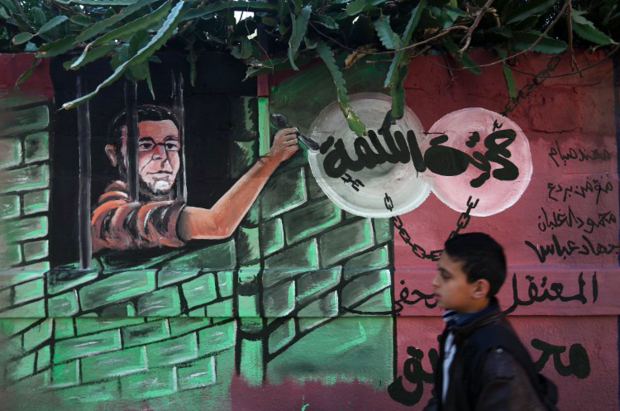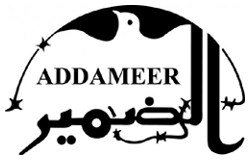DURA, Occupied Palestinian Territories – When Fayha Salash talks of the man her husband is, she speaks with a smile – even if the circumstances are dire. Her husband, Mohammed al-Qiq, has been on hunger strike for 70 days and counting. His lawyers describe him as close to death with Robert Piper, a top UN official in the region on Tuesday saying he was “alarmed by [al-Qiq’s] rapidly deteriorating health”.

A Palestinian boy walks past a mural depicting Palestinian journalist Mohammed al-Qiq, during a demonstration on 1 February, 2016 in Gaza city (AFP)
He has now lost the power of speech, with family now fearing for the worst.
“If I want any one thing to be clear, it is that my husband is not suicidal,” Salash said. “My husband loves life, he loves me and his children and his job very much. He is a dedicated father and journalist and he is doing this for no other reason than for justice, not for death.”
Al-Qiq was arrested on 21 November at his home in Ramallah for alleged terrorist links and has been held without trial under Israel’s controversial administrative detention policy which allows prisoners to be held without charge or trial, indefinitely.
On 27 January, al-Qiq’s lawyer, Jawad Bulous, brought an appeal to Israel’s supreme court, which requested al-Qiq be released from administrative detention due to his health. The request was denied, and al-Qiq, a 33-year-old journalist originally from Dura, outside Hebron, has remained behind bars.
Following the ruling, the EU expressed its disapproval of al-Qiq’s internment without charge or trial. The statement said al-Qiq, like the more than 500 other Palestinians being held on administrative detention, “have the right to be informed about the charges underlying any detention, must be granted access to legal assistance, and be subject to a fair trial.”
The EU missions added that they were “especially concerned about the deteriorating health condition of the Palestinian journalist”.
Israeli authorities have told al-Qiq’s lawyer that the reporter for Saudi-owned TV channel Almajd is being held under administrative detention for “incitement” against Israel, as well as working with Hamas, a Palestinian political party which rules the Gaza Strip and is considered illegal under Israeli law. Israeli authorities have also said al-Qiq is a “threat to the security of the area,” according to Amnesty International, which has also spoken out against his detention.
Salash denied the claims. She said her husband takes his job as a journalist very seriously, and that he was instead detained because of his work with Almajd or Glory in Arabic.
According to Salash, after al-Qiq was initially detained, Israeli forces played back coverage that he had created for the network, claiming the reports were inciting. But Salash has watched her husband’s dispatches, and cannot think which report could have been interpreted as incitement.
As far as the accusations levied against him for working with Hamas, Salash is adamant that her husband is not the man Israel has painted him to be.
“We met in university, both of us were studying journalism, we graduated together and he encouraged me to work, if it wasn’t for him I would probably had never gotten the chance to use my degree,” Salasha, who works as a freelance journalist said. “He even asked me to keep my last name, he wanted me to be his equal, his partner. Our marriage is about sharing, he is not some extremist guy.”
Salash said her husband, who was able to spend much of his time at home with her and his children, often encouraged her to go back to school for a Master’s degree.
Al-Qiq himself has a bachelor’s degree in journalism, and a master’s degree in political science from Ramallah’s Birzeit University.
His brother, Hamam al-Qiq, who is a lawyer, said their father, also a lawyer, always encouraged education in their home.
“Every one of my brothers and sisters finished high school and most of us college as well,” Hamam said.
Al-Qiq was always stubborn growing up, and his brother said he is not surprised that his life has come to this.
“My brother is always standing up for the right thing, if he sees something that is unjust he does not stay silent,” Hamam said.
Al-Qiq was detained for a month in 2003, again in 2004, when he served 13 months, and again in 2008 for his activity in Ramallah’s Birzeit University’s student council.
Al-Qiq’s family said the detentions were for his work as a journalism student and his community activism as student class president.
Middle East Eye was unable to immediately make contact with al-Qiq’s lawyer, Bulous, for comment.
Al-Qiq’s father, Ahmad, said he believes Israel is making an example of his son to silence other Palestinian journalists who are trying to cover the reality of occupation.
“The Israeli government sees that good people like my son are uncovering their lies and they will do anything to silence them,” Ahmad said. “If not, why does Israel not actually press charges? They have already told us the reasons they say they are holding him – for ‘incitement,’ which could mean anything, and these other fake charges – so it can’t be security concerns around making the charges public.”
“If there was real evidence then they why not press charges,” Ahmad added. “They can’t and they won’t because they know they don’t have anything to indict my son.”
“As a lawyer I think Israel is just showing itself to the world more and more everyday [and showing] that it is not this democracy that it makes itself out to be. You can’t just arrest a journalist and hold him for months on end without pressing charges. There is obviously no free speech in Israel.”
Sitting next to her father-in-law, al-Qiq’s wife nods in agreement.
“Every Palestinian journalist knows this day might come, we are always prepared for our work to hit a spot Israel does not like that will lead their soldiers to come to take them,” Salash said.
When asked if she has considered stopping her own work as a journalist after seeing what has happened to her husband, Salash said she had not, “not even for one moment”.
“Our work is important, that is the end of it, Palestinians cannot be silenced by intimidation.”
During the sit-down with al-Qiq’s family, his four-year-old son bust into the room, rushing to his mother mid-tantrum because his hands were cold from playing in the newly fallen snow outside.
Salash patiently held his hands in hers, sweetly willing him to calm down.
“A lot of Mohammed’s work was from home, he was always around,” Salash said.
“It has been very hard on the kids. When my son asks me why the soldiers took their father away I don’t know what to say, he is too young, sometimes I just say ‘the soldiers are naughty,’ and leave it at that, other times I try to change the subject, he doesn’t understand.”
As al-Qiq’s health continues to deteriorate, his family said there was no doubt in their mind that their ordeal will end only one of two ways.
“My husband has made his decision, it is either freedom or death, that is his choice, and as a martyr or a free man, we support him.”




